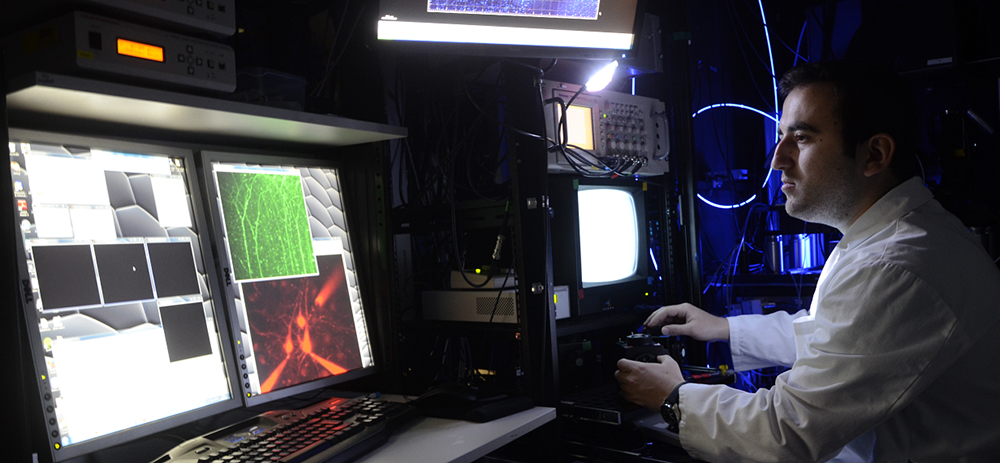Alexandra Kindrat, PhD
Program Manager
514-934-1934
ext. 44237
|
About Us
|
|
|---|
|
Research
|
|
|---|
|
Services
|
|
|---|

The Brain Repair and Integrative Neuroscience (BRaIN) Program at the Research Institute of McGill University Health Centre (MUHC) brings together over 125 neuroscientists, neurologists, ophthalmologists, psychiatrists, neurosurgeons, population health researchers, and more than 300 trainees to advance knowledge in key areas of research, and facilitate multidisciplinary collaboration by consolidating its members’ expertise within a single entity.
Our scientists investigate the intricate molecular pathways that help nerve cells grow and connect, they map brain-wide networks that support motor, sensory, cognitive, and affective functions, and they apply this knowledge to manage and treat disorders of the nervous system. Our research is integrated with clinical settings across multiple research sites.
The BRaIN Program is centred around five main research themes:
Review our selected highlights and publications in The Institute’s 2025 Annual Report.
More selections: 2024; 2023; 2022; 2021; 2020.
The BRaIN Program is committed to supporting and strengthening EDI within the research environment. The BRaIN Program has a fundamental and unwavering commitment to fostering a diverse community of researchers and scientists, where racism and discrimination in any form is not accepted or tolerated. Read more about our commitment to EDI.
We are proud to celebrate the scientific achievements of our researchers and trainees in publications, grant competitions, honors and awards, and appointments, as well as in the mainstream press.
The BRaIN Program organizes and supports numerous speakers, seminars, and symposia throughout the year.
Subscribe to our mailing list! Send an email to brainPraesent id dolor porta, faucibus eros vel@muhc.mcgill.ca
Researchers in the BRaIN program are involved in a multitude of research initiatives, including:
Healthy Brains, Healthy Lives (HBHL) is a multidisciplinary initiative located at McGill University, building scientific excellence and global leadership in the areas of neuroscience that hold the greatest promise for implementable, clinically effective outcomes in brain and mental health.
The Transforming Autism Care Consortium (TACC) is a research network that connects and mobilizes Quebec’s strengths in autism research to improve quality of life for people with autism and their families. TACC accelerates scientific discovery, builds capacity and integrates evidence in practice and policy.
The Canadian Longitudinal Study on Aging (CLSA) is following 50,000 older adults for at least 20 years, collecting information on the changing biological, medical, psychological, social, lifestyle and economic aspects of participants’ lives, and studying their health, disease and disability.
The Convergence Initiative is an independent Canadian non-profit organization dedicated to advancing knowledge of neuroscience and art and promoting cross-pollination between these two disciplines.
The Movement Disorders Program works to ensure the best care for patients suffering from reduced mobility and for their families. The clinic has been designated as a Centre of Excellence for Research and Treatment by the National Parkinson Foundation.
The Experimental Therapeutics Program (ETP) bridges basic research in neurobiology and immunology with human studies of neurological and immune-mediated diseases. ETP’s core laboratory platforms integrate fundamental research activities with rigorous studies on human biological samples.
The mission of the McConnell Brain Imaging Centre (BIC) is to understand the structure and function of the brain in health and in disease, through the development of novel neuroscience approaches and neuroimaging methods, thereby facilitating translation into clinical care.
The Traumatic Brain Injury (TBI) Research Unit and the TBI Program at the McGill University Health Centre (MUHC) aim to provide an understanding of brain injuries for medical, rehabilitation and community resource services through research, information, prevention, education and advocacy.
The MUHC Addictions Unit provides care for adults with drug, alcohol and mental health disorders. Research is conducted to improve services and outcomes for patients, and to further understand the genetic, biological and psychological factors that contribute to the development of addiction.
The Mood Disorders Program (MDP) aims to improve and preserve the mental health of patients. The program provides best care practice, and conducts clinical and basic research to further our understanding of the determinants, risk factors, course and progression of mood disorders.
The McGill-Mouse-Miniscope (M3) Touchscreen Behaviour Platform is a cohesive imaging and behavioural neuroscience research laboratory, with a mission to develop new expertise and technologies that bridge research from mouse to human.
Don’t hesitate to contact the BRaIN Program at the RI-MUHC. We welcome your inquiries!!

The Research Institute of the McGill University Health Centre (RI-MUHC) is a world-renowned biomedical and healthcare research centre. The Institute, which is affiliated with the Faculty of Medicine of McGill University, is the research arm of the McGill University Health Centre (MUHC) – an academic health centre located in Montreal, Canada, that has a mandate to focus on complex care within its community. The RI-MUHC supports over 460 researchers and close to 1,300 research trainees devoted to a broad spectrum of fundamental, clinical and health outcomes research at the Glen and the Montreal General Hospital sites of the MUHC.
